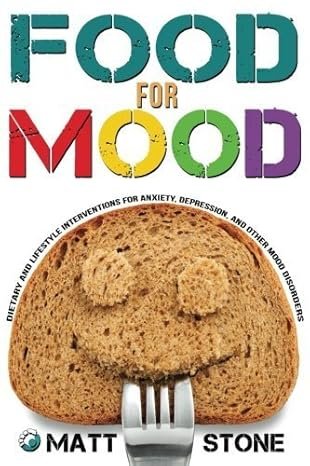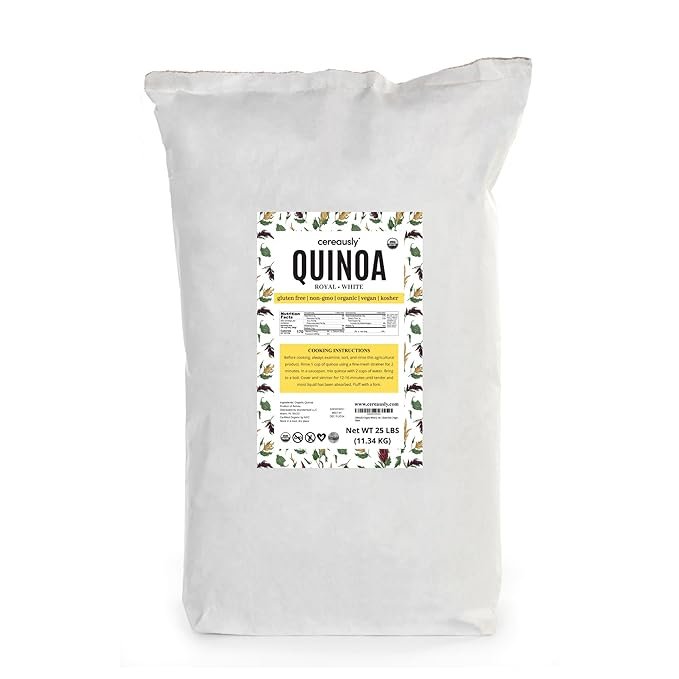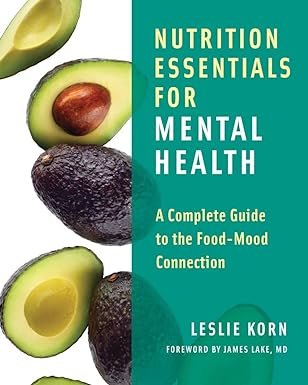Influence of Diet and mood
The relationship between diet and mood is an area of growing interest in scientific research. It has been shown that the foods we eat can have a significant impact on how we feel emotionally. For example, some studies suggest that a diet rich in fruits, vegetables, whole grains, fish, and olive oil may be associated with a lower incidence of depression and anxiety.
Diet and mood
On the other hand, excessive consumption of processed foods, refined sugars, and trans fats can increase the risk of experiencing mental health problems. The connection between food and mood is complex and multifaceted, but it is clear that what we eat can have a significant impact on our mental and emotional health.
Food for Mood: Dietary and Lifestyle Interventions for Anxiety, Depression, and Other Mood Disorders by Matt Stone
We’ve Strayed from the Basics Medical and pharmaceutical advancements in the realm of depression, anxiety, and other mood disorders are astounding. The technology we have available and the boon in our collective understanding of the brain and how it works have come a very long way in recent decades. But there’s a problem with all this fancy gadgetry, complex medical jargon, and piles of They distract us from the basic fundamentals of physical and emotional health, and keep us focused on exotic-sounding cures that rarely pan out. The Answers may be simpler than you think Waiting around for the latest research finding to unlock the key to your problems with anxiety, panic attacks, and depression? Does the answer lie in a gene from a tissue sample out of the hippocampus of a Wistar rat? Doubtful. In fact, an army of smart people in white coats with a truckload of test tubes have far less power over your emotional health than someone you know. That someone is you. While none of us will ever be as happy as Pee-wee Herman buffing the fender on his shiny red bike, the path to having a predominantly calm, stable, upbeat demeanor might be shorter and straighter than you think. Eat, Sleep, and be Merry In Food for Dietary and Lifestyle Interventions for Anxiety, Depression, and Other Mood Disorders, independent health researcher Matt Stone brings forth revolutionary findings about basic aspects of our physiology such as metabolic rate, carbon dioxide levels, hormonal rhythms, hydration, and more—and explores their ties with emotional health. With simple tactics that anyone can implement, Stone puts the power back in your hands to get off the emotional rollercoaster ride and be your best. Read Food for Mood now, and regain control of your emotions without any medications, supplements, gadgets, or expensive doctor visits.

What if there was a diet that helped me improve my mood and mood?
A balanced 1,800-calorie diet that can help improve mood would include a variety of nutrient-dense foods that promote the production of neurotransmitters linked to happiness and emotional well-being.
Below is an example of a balanced 1800 calorie diet:
Breakfast:
- 1 cup of oatmeal cooked with fresh fruits and nuts
- 1 glass of almond milk
- 1 piece of fruit, such as an apple or pear
Lunch:
- Quinoa salad with fresh vegetables, avocado and chickpeas
- 1 portion of grilled salmon
- 1 cup of green tea

CEREAUSLY Organic White Quinoa – Premium Royal Quinoa from Bolivia – Kosher and Non-GMO Quinoa Bulk – Vegan and Gluten-Fee Cooking Quinoa – 25 LB
Delicious Meals: The Cereausly organic quinoa is a must-have ingredient in any pantry! Ideal for a wide range of side or main dishes, this ingredient is a great way to add flavor and consistency to your meals.
The Quality You Deserve: Our white quinoa is premium grade organic. Royal quinoa is a premium ingredient from Bolivia, Uyuni Salt Flat where the conditions are ideal for this delicious ingredient.
Pick Your Color: This quinoa cereal is available in white, red, tricolor, or black. We have prepared bags of 4lb, 10lb, or 25lb that are suitable for home use, restaurants, and wholesale.
Special Ingredient: Unlike other similar products, our white quinoa is certified Kosher, as well as royal and organic. This product is also non-GMO, gluten-free, and vegan which makes it suitable for a wide range of diets.
Excellent Nutrients: Using bulk quinoa for your meals can be a great addition to your diet. Quinoa is classified as a whole grain and is a good source of plant protein and fiber, as well as plenty of vitamins and minerals.
Snack:
- 1 natural yogurt with red fruits and chopped almonds
Dinner:
- 1 portion of baked chicken with herbs and lemon
- 1 cup of sweet potato puree
- Steamed vegetables, such as broccoli or carrots
- 1 glass of water with lemon
This example of a balanced diet provides a variety of important nutrients that can improve mood, such as omega-3 fatty acids found in salmon, B vitamins in quinoa and walnuts, and antioxidants in fruits and vegetables. Additionally, foods rich in tryptophan are included, an amino acid precursor to serotonin, a key neurotransmitter in mood regulation.
This is just an example of how diet can help you, but it will never replace a visit with a health professional. Therefore, I recommend that if you have any questions or problems, you always consult your doctor.
Nutrition Essentials for Mental Health: A Complete Guide to the Food-Mood Connection
Exploring the connection between nutrition and mental wellness so therapists can provide more effective, integrated treatment.
Diet is an essential component of a client’s clinical profile. Few therapists, however, have any nutritional training, and many don’t know where to begin. In Nutrition Essentials for Mental Health, Leslie Korn provides clinicians with a practical guide to the complex relationship between what we eat and the way we think, feel, and interact with the world.
Where there is mental illness there is frequently a history of digestive and nutritional problems. Digestive problems in turn exacerbate mental distress, all of which can be improved by nutritional changes. It’s not unusual for a deficit or excess of certain nutrients to disguise itself as a mood disorder. Indeed, nutritional deficiencies factor into most mental illness―from anxiety and depression to schizophrenia and PTSD―and dietary changes can work alongside or even replace medications to alleviate symptoms and support mental wellness.
Nutrition Essentials for Mental Health offers the mental health clinician the principles and practices necessary to provide clients with nutritional counseling to improve mood and mental health. Integrating clinical evidence with the author’s extensive clinical experience, it takes clinicians step-by-step through
the essentials for integrating nutritional therapies into mental health treatment. Throughout, brief clinical vignettes illustrate commonly encountered obstacles and how to overcome them.
Readers will learn:
• Why nutrition matters in mental health
• The role of various nutrients in nourishing both the brain and the gut, the “second brain”
• Typical nutritional culprits that underlie or exacerbate specific mental disorders
• Assessment techniques for evaluating a client’s unique nutritional needs, and counseling methods for the challenging but rewarding process of nutritional change.
• Leading-edge protocols for the use of various macro- and micronutrients, vitamins, and supplements to improve mental health
• Considerations for food allergies, sensitivities, and other special diets
• The effects of foods and nutrients on DSM-5 categories of illness, and alternatives to pharmaceuticals for treatment
• Comprehensive, stage-based approaches to coaching clients about dietary plans, nutritional supplements, and other resources
• Ideas for practical, affordable, and individualized diets, along with optimal cooking methods and recipes
• Nutritional strategies to help with withdrawal from drugs, alcohol and pharmaceuticals
And much more. With this resource in hand, clinicians can enhance the efficacy of all their methods and be prepared to support clients’ mental health with more effective, integrated treatment.

